Dozens of protesters killed, 12 police dead in Kazakhstan unrest
Central Asian country is experiencing the worst street
protests since gaining independence 3 decades ago
Security forces killed dozens of protesters and 12 police died during extraordinarily violent demonstrations in Kazakhstan that saw government buildings stormed and set ablaze, authorities said Thursday. One police officer was found beheaded in escalating unrest that poses a growing challenge to authoritarian rule in the Central Asian nation.
Despite the severe response from authorities, protesters took to the streets again in the country's largest city, Almaty, a day after breaking into the presidential residence and the mayor's office there.
Police were out in force again, including in the capital of Nur-Sultan, which was reportedly quiet, and Russian troops were on their way. Russia's Sputnik news service reported that shots were fired as police surrounded one group of about 200 protesters in the city.
So far, 2,000 people have been arrested, the Interior Ministry said.
In the unrest on Wednesday, "dozens of attackers were liquidated," police spokeswoman Saltanat Azirbek told state news channel Khabar-24, using a term common to describe the killing of people thought to be extremists by law enforcement.
Twelve police officers were killed in the unrest and 353 injured, according to city officials cited by the channel.
Tens of thousands of demonstrators
Tens of thousands of people, some reportedly carrying clubs and shields, have taken to the streets in recent days in the worst protests the country has seen since gaining independence from the Soviet Union three decades ago.
Although the demonstrations began over a near-doubling of prices for a type of vehicle fuel, their size and rapid spread suggest wider discontent in a country that has been under the rule of the same party since independence.
The government on Thursday announced a 180-day price cap on vehicle fuel and a moratorium on raising utility rates — an attempt to address the economic issues that catalyzed the protests. It was unclear what, if any, effect the moves would have.
The president has vacillated between attempts at mollifying the protesters, including accepting the resignation of his government, and promising harsh measures to quell the unrest, which he blamed on "terrorist bands."
Worries that a broader crackdown could be on the horizon grew after Tokayev called on a Russia-led military alliance, the Collective Security Treaty Organization, for help. Severe interruptions to internet service also raised concern and made it difficult — sometimes impossible — for news of what was happening inside Kazakhstan to get out.
In other apparent attempts to seal the country off, the airports in Almaty and one other city have been shut.
The CSTO said early Thursday that it would send peacekeeper troops to Kazakhstan at Tokayev's request.
The operation is the first military action by the alliance — an indication that Kazakhstan's neighbours, particularly Russia, are concerned that the unrest could spread.
Peacekeeping forces deployed
Russia and Kazakhstan share close relations and a 7,600-kilometre border, much of it along open steppes. Russia's manned space-launch facility, the Baikonur Cosmodrome, is in Kazakhstan.
The size and duties of the peacekeeping force have not been specified. Russia has already begun sending forces, according to the CSTO, which includes Kazakhstan, Armenia, Belarus, Kyrgyzstan and Tajikistan. But Kyrgyzstan's presidential spokesman, Erbol Sutanbaev, said his country's contingent must be approved by parliament and said that the troops would not take actions involving demonstrators.
Tokayev has imposed a two-week state of emergency for all of Kazakhstan, including an overnight curfew and a ban on religious services. That is a blow to the country's sizeable Orthodox Christian population, who observe Christmas on Friday.
Of the five Central Asian republics that gained independence following the dissolution of the Soviet Union, Kazakhstan is by far the largest and wealthiest, spanning a territory the size of Western Europe and sitting atop colossal reserves of oil, natural gas, uranium and precious metals.
In addition to Kazakhstan's long border with Russia, it also shares one with China, and its oil and mineral wealth make it strategically and economically important.
Protests reflect broad discontent
Despite Kazakhstan's natural riches and a solid middle class, financial hardship is widespread, and discontent over poor living conditions is strong in some parts of the country. Many Kazakhs also chafe at the dominance of the ruling party, which holds more than 80 per cent of the seats in parliament.
The protests appear to have no identifiable leader or demands. Much of the anger displayed in recent days was directed not at Tokayev, but at Nursultan Nazarbayev, the country's first president who continued to wield enormous influence after his 2019 resignation. Protesters shouted "Shal ket!" ("Old man go"), an apparent reference to Nazarbayev, who dominated Kazakhstan's politics and whose rule was marked by a moderate cult of personality.
After the demonstrations spread to Nur-Sultan and Almaty, the government announced its resignation, but Tokayev said the ministers would stay in their roles until a new Cabinet is formed, making it uncertain whether the resignations will have significant impact.
At the start of the year, prices for liquified gas fuel roughly doubled as the government moved away from price controls as part of efforts to move to a market economy.
Moscow-led ‘peacekeeping’ alliance enters country amid violent clashes between protesters, police and army
00:45 Gunfire heard during protests in Kazakhstan's biggest city – video
Shaun Walker and Naubet Bisenov in Aktobe province, and agencies
Thu 6 Jan 2022
Russian paratroopers have arrived in Kazakhstan as part of a “peacekeeping” mission by a Moscow-led military alliance to help the president regain control of the country, according to Russian news agencies.
Kazakhstan’s president, Kassym-Jomart Tokayev, asked for the intervention from the Collective Security Treaty Organization (CSTO) – an alliance made up of Russia, Armenia, Belarus, Kazakhstan, Kyrgyzstan and Tajikistan – late on Wednesday and it was swiftly approved.
It comes as violent clashes continue between protesters and the police and army in Kazakhstan.
There is little reliable information on the number of casualties, but local news agencies quoted a spokesperson for police in Almaty, the country’s largest city, saying dozens of people were killed during attacks on government buildings.
Almaty city authorities said on Thursday that 353 police and security forces personnel had been injured, and 12 killed.
On Thursday morning, shots were fired as troops entered Almaty’s main square. Several armoured personnel carriers and dozens of troops moving on foot arrived on Thursday morning, with shots heard as they approached the crowd, Reuters witnesses said.
Kazakhstan protests: Protesters storm government buildings – video
State television reported on Thursday that the National Bank of Kazakhstan had suspended all financial institutions. The internet in the country is mostly down as well as mobile phone reception.
On Wednesday, there had been reports of violent clashes and shooting in Almaty and other cities, as well as unverified videos suggesting casualties among protesters.
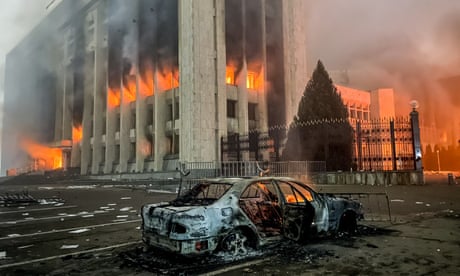
Violent clashes in Kazakhstan amid fuel protests – in pictures
On Wednesday night, Tokayev asked the CSTO to help him regain control. Armenia’s prime minister, Nikol Pashinyan, said the alliance would dispatch forces to “stabilise” the central Asian country.
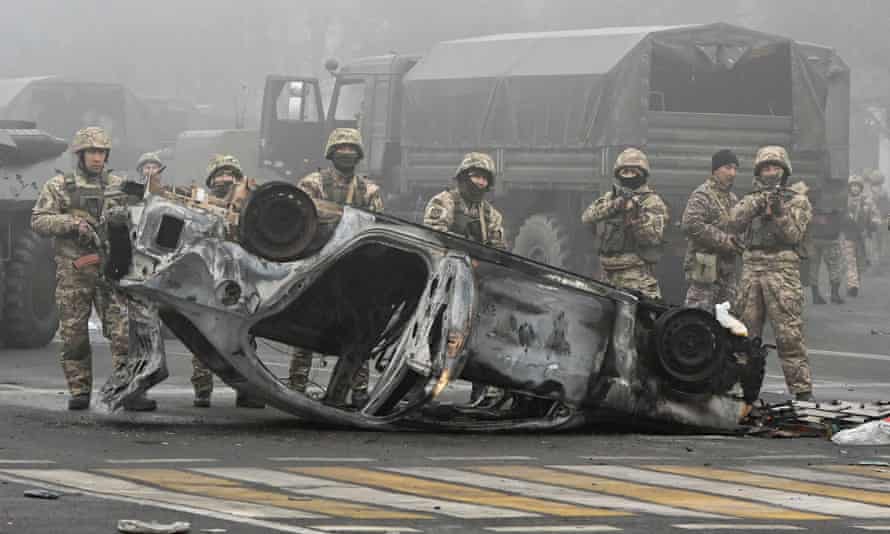
It is not clear how many troops the CSTO will send or how long they will stay in the country. Russian MP Leonid Kalashnikov told Interfax the troops would stay “for as long as the president of Kazakhstan believes it necessary”. He said they would mainly be engaged in protecting “infrastructure” in the country.
Tokayev had appealed to the bloc for help, decrying the actions of “terrorists” and alleging the country had been the victim of “attacks” by foreign-trained gangs after fuel price rises triggered widespread protests.
On Wednesday, demonstrators took over government buildings and reportedly stormed the airport in Almaty, the country’s commercial capital.
“Almaty was attacked, destroyed, vandalised, the residents of Almaty became victims of attacks by terrorists, bandits, therefore it is our duty … to take all possible actions to protect our state,” said Tokayev, in his second televised address in a matter of hours.
The Kazakh events come at a time when all eyes have been on a possible Russian intervention in Ukraine. Images of police being overpowered by protesters are likely to cause alarm in Moscow, as another country neighbouring Russia succumbs to political unrest. Kazakhstan is part of an economic union with Russia and the two countries share a long border.
The protests began in the west of the country at the weekend, after a sharp rise in fuel prices, but have spread quickly and taken Kazakhstan’s authorities and international observers by surprise.
The protests have swelled amid broader discontent with Tokayev, president since 2019, and Nursultan Nazarbayev, the former leader.
“Nazarbayev and his family have monopolised all sectors, from banking to roads to gas. These protests are about corruption,” said 55-year-old Zauresh Shekenova, who has been protesting in Zhanaozen since Sunday.
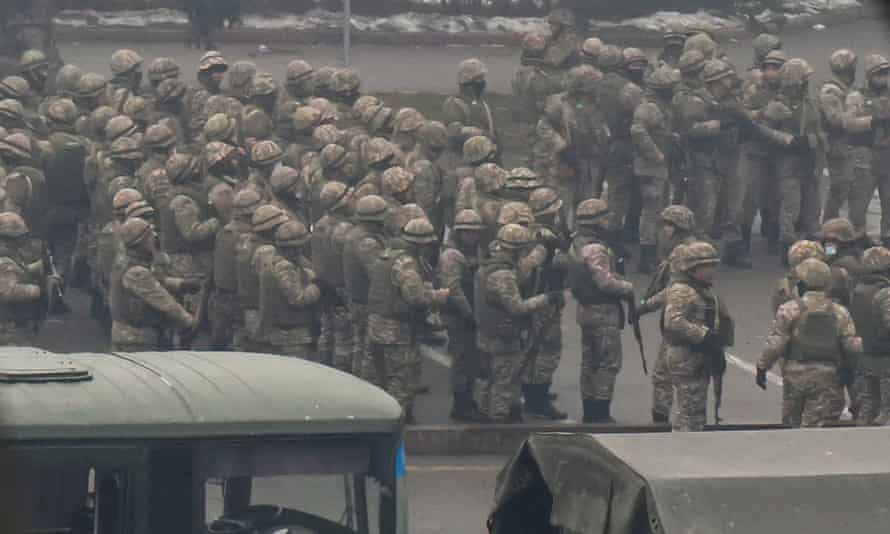
“It all started with the increase in gas prices but the real cause of the protests is poor living conditions of people, high prices, joblessness, corruption.”
Darkhan Sharipov, an activist from the civil society movement Wake Up, Kazakhstan, said: “People are sick of corruption and nepotism, and the authorities don’t listen to people … We want President Tokayev to carry out real political reforms, or to go away and hold fair elections.”
The five former Soviet Central Asian republics have been largely without protest in their three decades of independence, with the exception of Kyrgyzstan, which has had several revolutions.
Kazakhstan has never held an election judged as free and fair by international observers. While it is clear there is widespread discontent, the cleansing of the political playing field over many years means there are no high-profile opposition figures around which a protest movement could unite, and the protests appear largely directionless.
PUBLISHED : 6 JAN 2022
WRITER: AFP

ALMATY (KAZAKHSTAN) - Security forces in Kazakhstan killed dozens of protesters trying to storm government buildings overnight, police said Thursday, after a Moscow-led military alliance agreed to send forces to help quell mounting unrest.
Long seen as one the most stable of the ex-Soviet republics of Central Asia, energy-rich Kazakhstan is facing its biggest crisis in decades after days of protests over rising fuel prices escalated into widespread unrest.
In the worst reported violence so far, police said dozens of people were killed in battles with security forces at government buildings in the country's largest city Almaty.
"Last night, extremist forces tried to assault administrative buildings, the Almaty city police department, as well as local police commissariats. Dozens of assailants were eliminated," police spokesman Saltanat Azirbek was quoted as saying by the Interfax-Kazakhstan, TASS and Ria Novosti news agencies.
Videos on social media on Thursday showed pillaged shops and burned buildings in Almaty, automatic gunfire in the streets and residents screaming in fear.
The growing unrest is presenting a major challenge to the authoritarian regime of President Kassym-Jomart Tokayev and has raised international concern, especially with key ally Moscow.
- 'Outside interference' -
With his repeated calls for calm ignored, Tokayev in an address to the nation early Thursday said he had appealed to the Russia-led Collective Security Treaty Organisation (CSTO), which includes five other ex-Soviet states, to combat what he called "terrorist groups" that had "received extensive training abroad".
The CSTO's chairman, Armenian Prime Minister Nikol Pashinyan, said the alliance would send "collective peacekeeping forces... for a limited period of time in order to stabilise and normalise the situation in this country" that was caused by "outside interference".
There were no immediate further details nor comment from Moscow, which dominates the alliance.
Tokayev said "terrorists" were seizing buildings, infrastructure and small arms, and fighting battles with security forces.
Protests spread across the nation of 19 million this week in outrage over a New Year increase in prices for liquid petroleum gas (LPG), which is widely used to fuel cars in the west of the country.
Thousands took to the streets in Almaty and in the western province of Mangystau, saying the price rise was unfair given oil and gas exporter Kazakhstan's vast energy reserves.
Protesters were reported to have stormed several government buildings on Wednesday, including the Almaty mayor's office and the presidential residence, with both said to be on fire.
As of late Wednesday, at least eight law enforcement officers had been killed and 317 wounded in the violence, according to the interior ministry quoted by local media.
The full picture of the chaos was unclear, with widespread disruptions to communications including mobile phone signals, the blocking of online messengers and hours-long internet shutdowns.
The protests are the biggest threat so far to the regime established by Kazakhstan's founding president Nursultan Nazarbayev, who stepped down in 2019 and hand-picked Tokayev as his successor.
Tokayev tried to head off further unrest by announcing the resignation of the government headed by Prime Minister Askar Mamin early on Wednesday, but protests continued.
- State of emergency -
Tokayev also announced he was taking over from Nazarbayev as head of the powerful security council, a surprise move given the ex-president's continued influence.
With protests escalating, the government late on Wednesday said a state of emergency declared in protest-hit areas would be extended nationwide and in effect until January 19.
It imposes an overnight curfew, restricts movements and bans mass gatherings.
Much of the anger appeared directed at Nazarbayev, who is 81 and had ruled Kazakhstan since 1989 before handing power to Tokayev.
Many protesters shouted "Old Man Out!" in reference to Nazarbayev and images posted on social media showed a statue of the ex-president being torn down.
The EU and the UN called for "restraint" on all sides, while Washington urged authorities to allow protesters to "express themselves peacefully."
Kazakhstan's government tolerates little real opposition and has been accused of silencing independent voices.
Spontaneous, unsanctioned protests are illegal despite a 2020 law that eased some restrictions on freedom of assembly.
Wed., January 5, 2022

Protests erupt after fuel price rise in Almaty
(Reuters) - Kazakhstan's slow-burning government reform of a niche market for car fuels brutally backfired this week, triggering the biggest public protests in years as demonstrators accused authorities of stealing from the poor.
Kazakhstan declared emergencies in the capital and elsewhere on Wednesday after demonstrators stormed and torched public buildings.
The protests were sparked by a fuel market reform first broached in 2015 that came into effect at the start of the month that sought to remove state price caps for butane and propane - often referred to as 'road fuels for the poor' due to their low cost - while making sure the local market was well supplied.
Previous subsidies had created a situation when Kazakhstan, a major oil producer, regularly faced shortages of butane and propane. Producers - including ventures of U.S. companies Chevron and Exxon - preferred to export to get a better price.
When prices were fully liberalised on Jan. 1 the government expectations were that supplies to the domestic market would rise and help address the chronic shortages.
But the measure backfired, as prices nearly doubled overnight to 120 tenge ($0.30) per litre.
Regions such as oil-rich Mangistau, where protests started, rely on butane and propane for refuelling as many as 90% of vehicles.
Alternative motor fuels such as gasoline and diesel are more costly at 180-240 tenge ($0.40-0.55) per litre.
Popular anger was already running high because of rising inflation which was closing in on 9% year-on-year - the highest in more than five years - leading the central bank to raise interest rates to 9.75%.
The resource-rich country of 19 million is estimated to have a million people living below the poverty line while also counting several dollar billionaires on the Forbes list.
The protests have yet to have an impact on Kazakhstan's oil production. President Kassym-Jomart Tokayev has ordered his acting Cabinet to reverse the fuel price rise.
(Reporting by Alla Afanasyeva and Dmitry Zhdannikov, Editing by Rosalba O'Brien)
Analysis: Nursultan Nazarbayev, behind-the-scenes powerbroker, thought he found a way to step aside without risking retribution
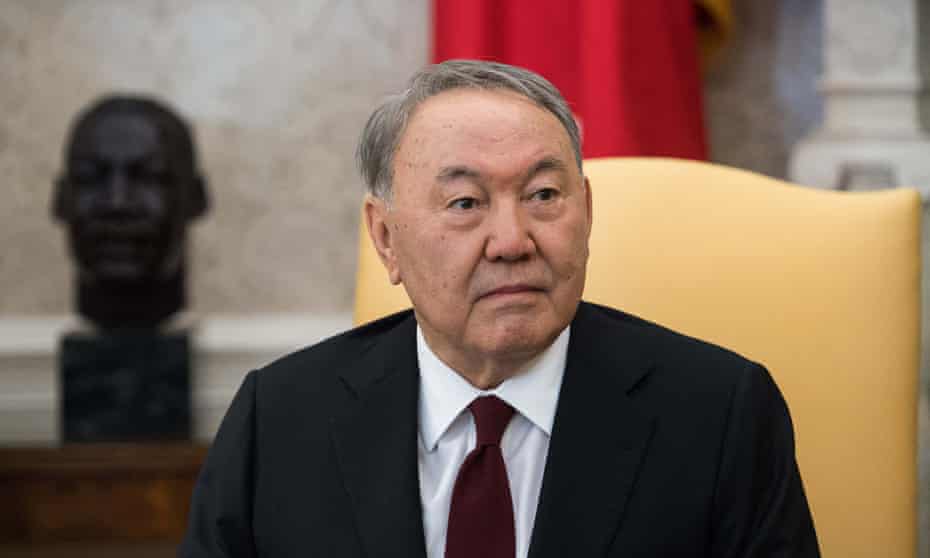
Shaun Walker
Wed 5 Jan 2022
For years, Nursultan Nazarbayev has been used to performative adoration from the citizens of Kazakhstan. The country’s leader for nearly three decades, he was showered with praise and adulation at showpiece events, and his image smiled down from billboards across the country.
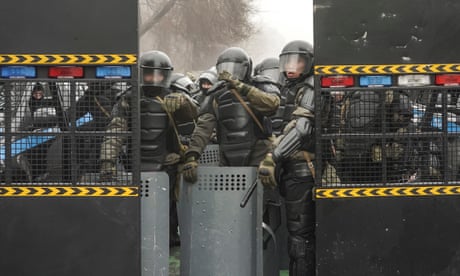
Kazakhstan protests: Moscow-led alliance sends ‘peacekeeping forces’
When he stepped down in 2019, he was able to choose his successor, Kassym-Jomart Tokayev, and kept significant power as head of the security council and general behind-the-scenes powerbroker. He retained his official title of Elbasy, or leader of the nation.
Astana, the capital city he ordered built in the heart of the Kazakh steppe, was even renamed in his honour.
To Nazarbayev, it must have seemed like he had found an answer to the problem vexing ageing autocrats across the region: how to step aside in old age without risking retribution. Vladimir Putin and others were doubtless watching with interest.
The events of the past few days might suggest that different lessons should be drawn. Statues of Nazarbayev, meant to be monuments to his legacy, have been torn down by protesters. Instead of chanting “Elbasy”, many angry Kazakh protesters are now chanting “Shal ket” – or “Old man, out!”
Discontent at poverty, inequality and corruption led to increasing unrest in the country in recent years, and much of the anger is directed at Nazarbayev himself, who for so long appeared untouchable.
Among Central Asia’s vicious and repressive autocrats, Nazarbayev always seemed the most nimble. Born in 1940, he rose through the ranks of the Communist party and became Kazakhstan’s first leader on independence.
He managed to hold the country together during the 1990s, and later to avoid the extreme repressive violence of his peers in Uzbekistan and Turkmenistan, while also avoiding the revolutionary sentiment of Kyrgyzstan. When 16 people were killed in 2011 protests, he solicited advice from Tony Blair about how best to spin the violence.
He charted a delicate geopolitical course in the years after Kazakh independence, remaining friendly towards Russia, while also courting western leaders and energy companies, who turned a blind eye to the lack of democracy and instead focused on securing lucrative contracts in the country.
Western lawyers, accountants and advisers helped the new Kazakh elite invest their fortunes in London mansions and Swiss villas. His daughter and grandson are believed to own £80m of London property. Nazarbayev also engaged a steady stream of western architects and urban planners to build his new capital city.
In 2010, Nazarbayev, perhaps with one eye on the clock, ordered scientists to investigate the creation of an “elixir” that could prolong human life. Eventually, it seems, he accepted the inevitability of the human ageing process and announced in 2019 he was stepping aside.
Last year, the director Oliver Stone made a hagiographic film portrait about Nazarbayev’s time in office, named Qazaq: History of the Golden Man, and numerous statues to the retired leader were erected across the country.
Now, his image has become a lightning rod for discontent. On Wednesday, Tokayev announced he was replacing Nazarbayev as chair of the security council, and there were rumours on Wednesday that Nazarbayev might leave the country for “medical treatment”.
It is not clear yet how the unrest in Kazakhstan will evolve, and what role Nazarbayev will play in them, but it seems certain that the events of the past few days will alter the historical legacy he had imagined he would leave.



No comments:
Post a Comment